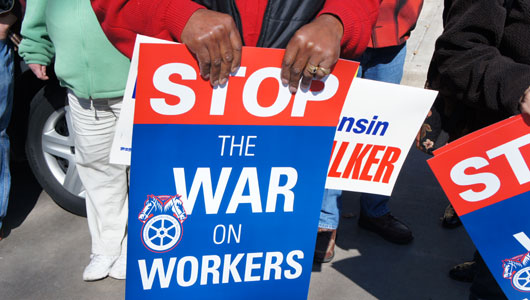
WASHINGTON – A top Communications Workers official has taken the union’s democracy crusade to the good-government group Common Cause, urging that it’s one big way to curb or stop the huge influence of corporate money in U.S. politics.
George Kohl, the union’s director of collective bargaining, distributed hand-held cards showing the link between declining union density and declining U.S. median incomes at a March 14 seminar on campaign finance during Common Cause’s “The Lessons of Watergate” conference.
He followed it up with the union’s booklet – which is available to other unions as well – describing CWA’s entire democracy crusade. It includes campaign finance reform, ending Senate filibusters, comprehensive immigration reform and voter registration and protection. CWA has been on the crusade for more than a year.
One of its causes is a constitutional amendment, which Common Cause also backs, saying that for purposes of politics, corporations are not persons and do not have the same rights as persons – including the right to unlimited cash-bought speech. In an infamous 2010 ruling, Citizens United, the U.S. Supreme Court said they did.
The prevalence of big corporate money in politics is in back of all the ills that afflict U.S. democracy, Kohl said. It fuels the careers of the filibustering Senate Republicans, who halt legislation such as the Employee Free Choice Act, he added.
And without the right to organize and bargain collectively, Kohl noted, workers cannot defend – much less increase – their living standards.
Corporate cash also pays for the secretive extremely pro-business American Legislative Exchange Council (ALEC), whose right-wing and anti-worker agenda dominates many states, other panelists said. They all offered ideas for curbing the influence of corporate contributions.
The corrupting influence of the corporate cash is the link between Watergate, 41 years ago, and today’s broken political system, many speakers said throughout the Common Cause conference. Its president, Bob Edgar, urged the hundreds of attendees to make reclamation of democracy their main project.
But the crusade may take a long time, Kohl admitted. And a constitutional amendment’s prospects are uncertain. So panelists offered other ways to combat the corrupting corporate cash – corruption that frequently hurts unionists, as corporate campaign finance committees outspend union counterparts by ratios of 8-1 or more.
One promising path is running through, of all places, the Securities and Exchange Commission (SEC), the federal agency that regulates stock markets and trading, said another panelist, Lisa Gilbert, director of Public Citizen’s Congress Watch.
Using new regulatory powers it got from the Dodd-Frank financial reform/crackdown law – enacted after Wall Street’s speculative frenzy and collapse produced the Great Recession – the SEC is considering making firms more publicly accountable to their shareholders. That includes public worker pension funds.
Its latest proposal is to order firms to justify their political spending to shareholders publicly and in advance, and to explain how such spending is “good for business,” Gilbert said. If enacted, that proposal would take effect at once.
Shareholders would then get a chance to weigh in, and possibly even vote, before firms spend their money for politicking by lobbies such as the U.S. Chamber of Commerce or secretive political institutions such as ALEC. The Chamber alone spent $36 million directly – and millions more indirectly – in last year’s campaign, she said.
The SEC has received a record 469,000 comments on its proposal “and only five have been negative,” Gilbert said. But she urged unionists and others to join the pressure, since the agency’s proposal is far from final.
Photo: Marcus Holowell/PW

MOST POPULAR TODAY


Zionist organizations leading campaign to stop ceasefire resolutions in D.C. area

Communist Karol Cariola elected president of Chile’s legislature

Afghanistan’s socialist years: The promising future killed off by U.S. imperialism

High Court essentially bans demonstrations, freedom of assembly in Deep South






Comments